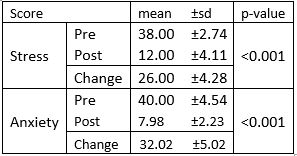Effect of Garbh Sanskar (Yoga) on Maternal and Perinatal Outcome
Abstract
Aims and Objectives: ‘Garbh’ implies embryo in the womb and ‘Sanskar’ implies instructing thepsyche. The objective of this prospective interventional study was to assess the effects of Garbhsanskar on maternal and fetal outcomes.
Material and Methods: A total of 200 antenatal motherswere selected at Aarogya Hospital, Vaishali, Ghaziabad and Chitra Vihar, Delhi, and asked to attendthree sessions of Garbh sanskar for one 1year (Jan 2019 to Jan 2020). Information booklet andstructured questionnaires were provided to assess their performance and feedback during thisperiod.
Result: Analysis of maternal and fetal outcome showed that out of 200 females, 20% hadLSCS, 6% had an instrumental vaginal delivery and 74% had a normal vaginal delivery. Only 7%developed some medical complications like PIH, GDM etc. Mean stress score decreased from 38 to12(by 46.4%) while mean anxiety score decreased from 40 to 8(by 64%) after Garbh Sanskar. Only16% of babies were LBW (< 2.5 kg), 88% had Apgar >7 and 6% of neonates required NICUadmission.
Conclusion: Garbh Sanskar is highly effective in reducing maternal stress, anxiety,medical co-morbidities and incidence of operative deliveries and gives better neonatal outcomes interms of better growth, birth weight and Apgar, hence its practice must be encouraged
Downloads
References

Copyright (c) 2022 Author (s). Published by Siddharth Health Research and Social Welfare Society

This work is licensed under a Creative Commons Attribution 4.0 International License.


 OAI - Open Archives Initiative
OAI - Open Archives Initiative


